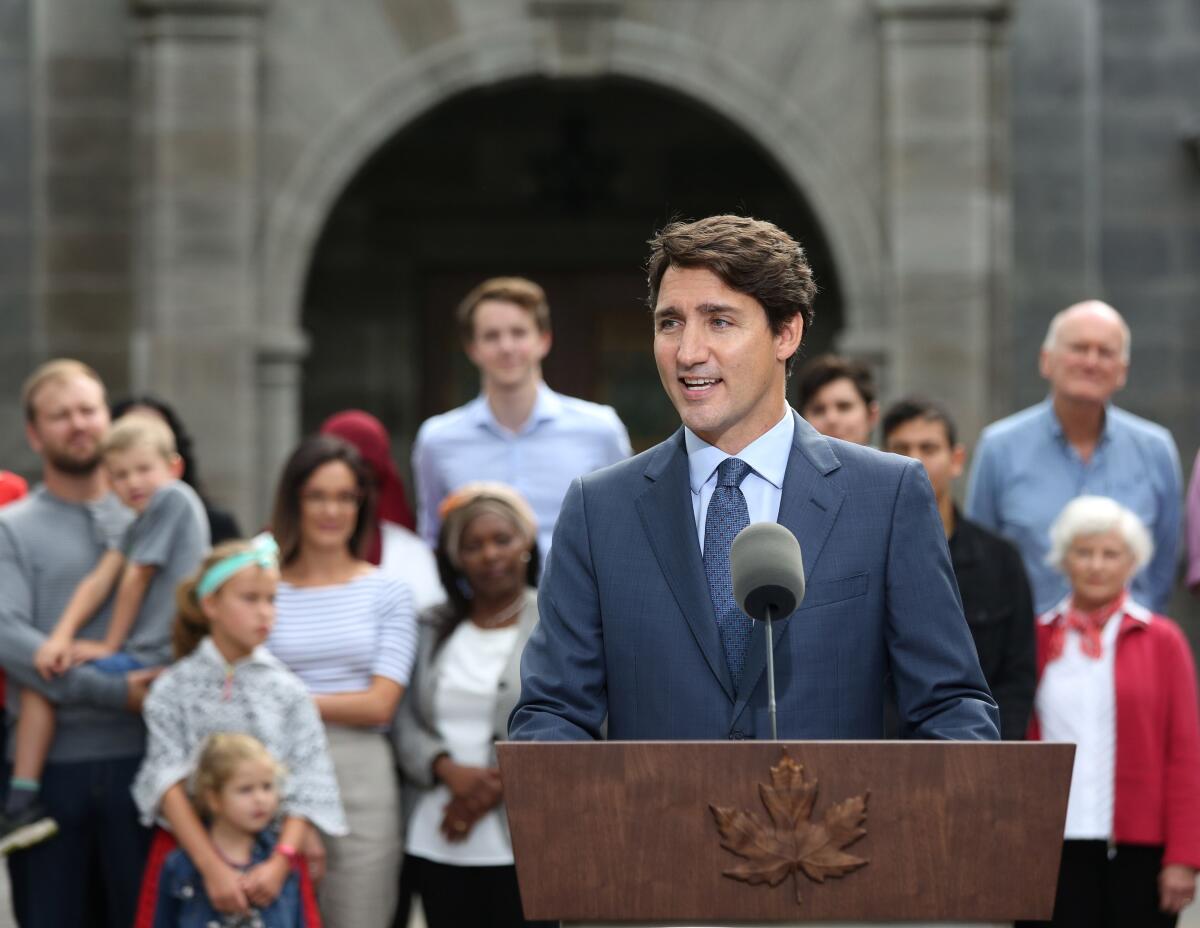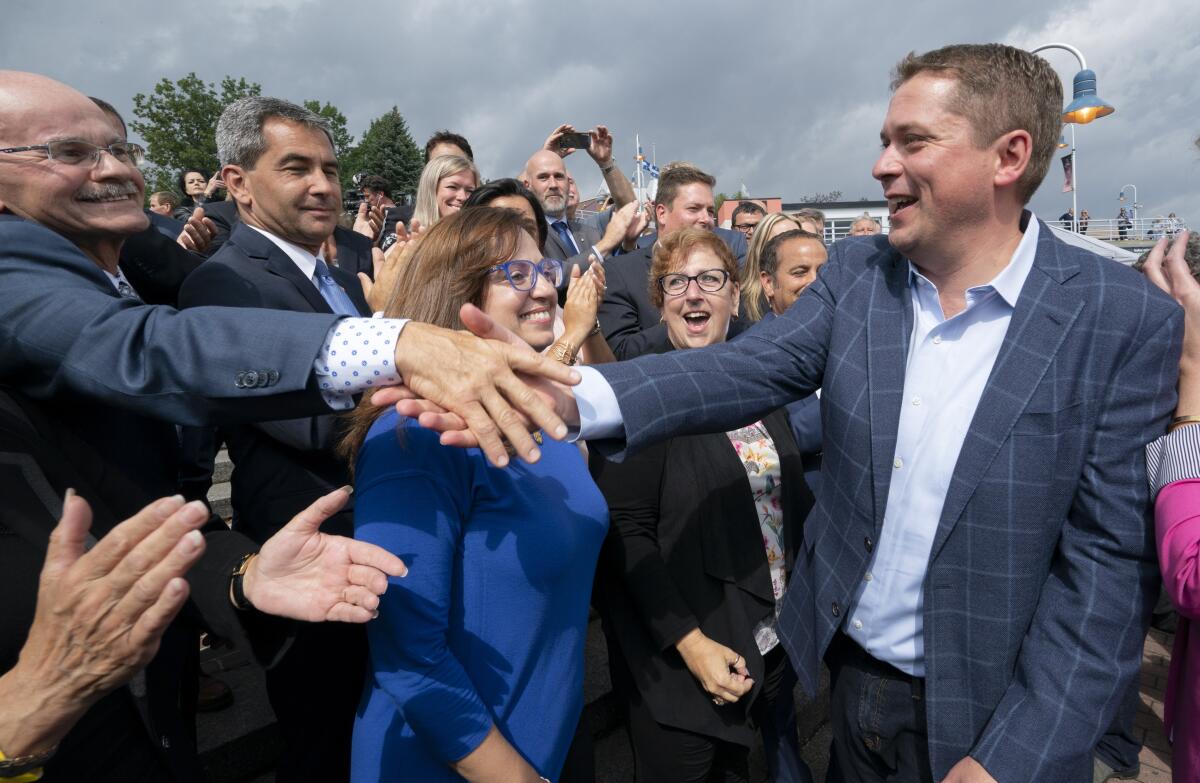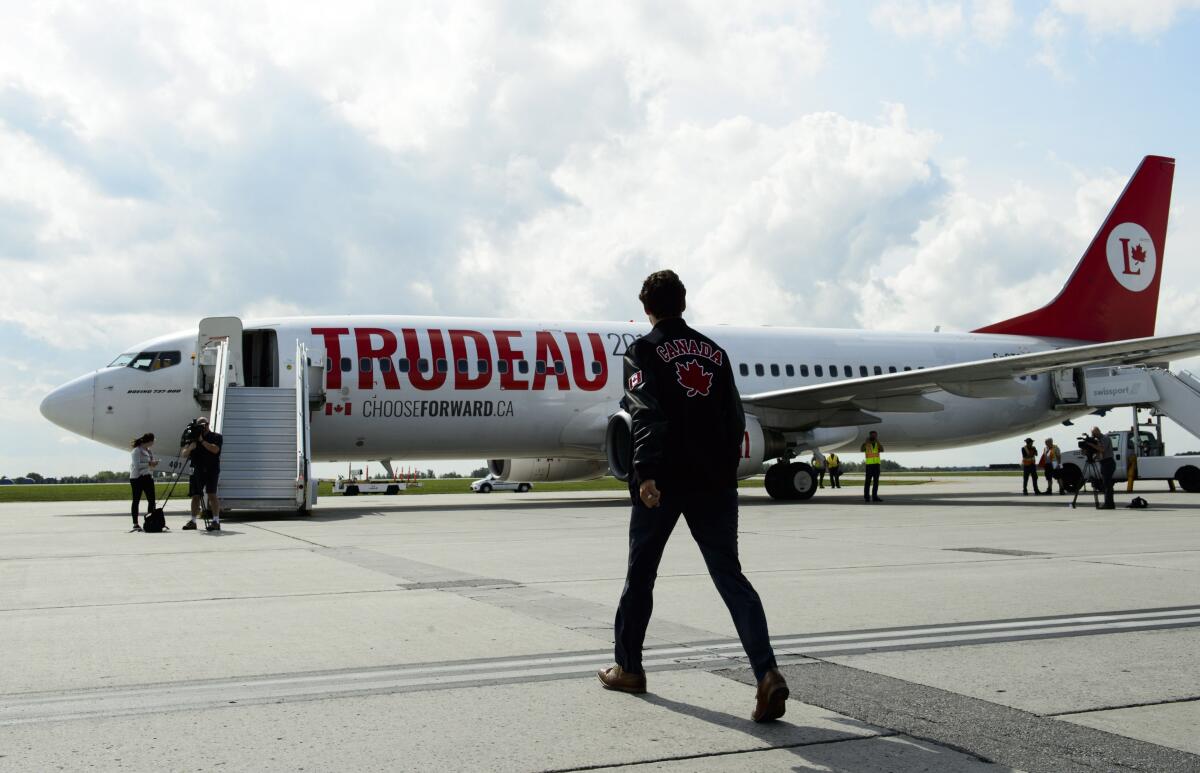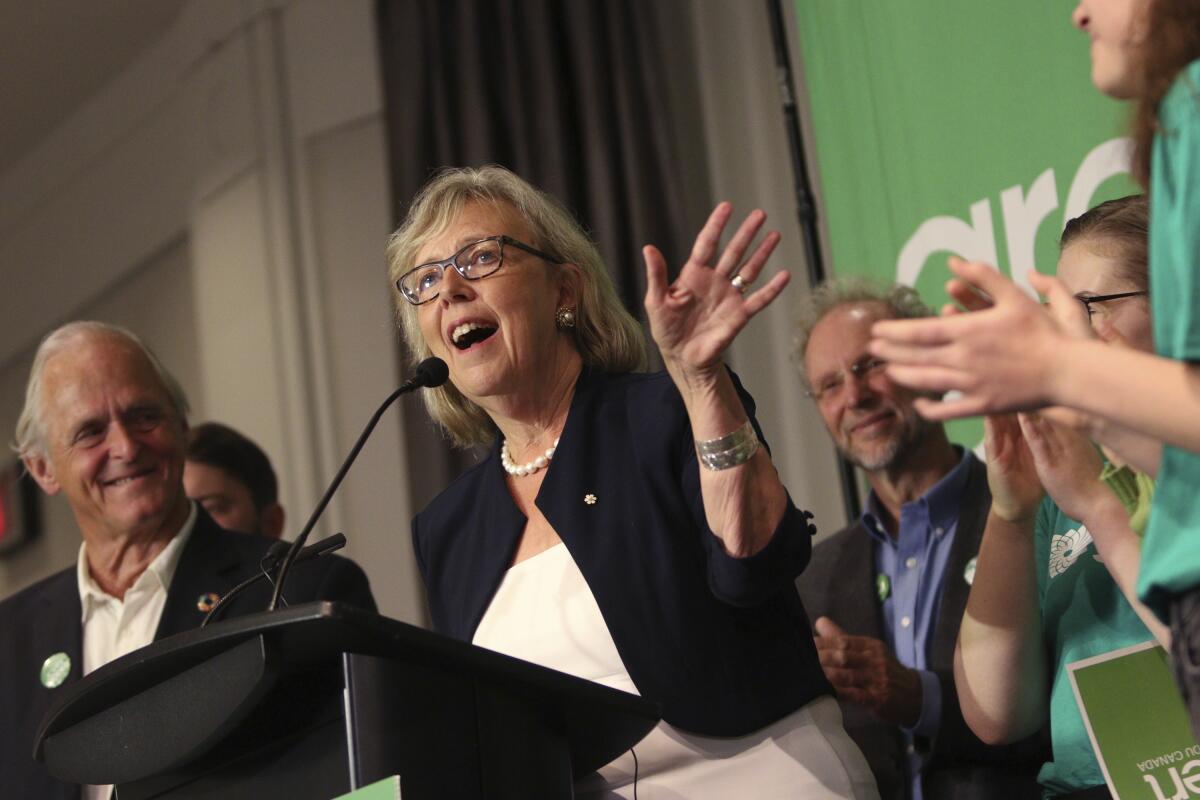Canadian Prime Minister Justin Trudeau is vulnerable in next month’s election

- Share via
MONTREAL — Canada has embarked on a six-week sprint to a national election that has the potential to end the leadership of Prime Minister Justin Trudeau, transforming the political landscape of the country and establishing a conservative bloc from the Rio Grande to beyond the Arctic Circle.
On the surface, the Oct. 21 federal election consists of 338 separate parliamentary contests but, as in British political contests, the balloting will determine whether Trudeau — the youthful son of a glamorous but controversial 20th century prime minister — retains the office he has held for nearly four years. His principal rival is Andrew Scheer, who for the last two years has led the country’s Conservative Party.
The campaign kicked off Wednesday, and analysts from all sides expect it to be nasty. The first ads already have been aired, and many of them are negative, befitting two leading candidates who begin their formal campaigns with large electoral hurdles. Trudeau is viewed negatively by 63% of Canadians and Scheer by 52%, according to the respected Angus Reid poll.
With a short campaign that will determine control of Canadian politics for as many as five years, the parties will launch their efforts fiercely and without restraint, at least by gentle Canadian standards.

The contest is regional (Trudeau is from Quebec, Scheer represents Saskatchewan), ideological (liberal versus conservative) — and personal (Trudeau cultivates a devil-may-care informality, Scheer bitterly characterizes his rival as the corrupt product of an entrenched political class). Both speak fluent French.
To an unusual degree, the election is shaped by the previous contest, in 2015, which catapulted the Liberals — once considered the natural party of governance but wallowing in third place at mid-decade — back into power in Ottawa, the first time any Canadian party has bounced back that far. The party’s parlous position allowed it to take unusual political risks, offering the voters an inexperienced leader who promised an ambitious reform agenda and gender equity in his Cabinet, which at the start of his tenure included four Sikhs, more than are in the Cabinet of India.
This election is almost entirely about Trudeau.

In 2015, Trudeau came across as optimistic, trustworthy, transparent and hopeful, a new face who would change politics and take it out of the sullen, accusatory rut it was in. After nearly 10 years of the abrasive leadership of Conservative Stephen Harper, Canadians were congenial to the notion of change and were vulnerable to Trudeau’s fresh, upbeat message.
This year’s balloting will test whether the prime minister’s communication style has grown stale, his authenticity has proved to be fleeting and his credibility has been undermined. His biggest threat: blowback from a complex influence scandal that led to the departure of a well-respected attorney general, an episode that suggested Trudeau was not as immune to traditional political pressures as he promised he would be.
“There’s less belief now that Trudeau will do politics differently,” said Paul Thomas, an emeritus political scientist at the University of Manitoba. “He wouldn’t say this about himself — he’s not all that self-reflective — but he’s now seen as a traditional politician, capable of top-down, heavy-handed leadership from the prime minister’s office.”
Next month’s contest is not about foreign policy, where the Canadian consensus for multilateralism prevails, as it has since the age of Lester B. Pearson, who won the Nobel Peace Prize in 1957 and was prime minister from 1963 to 1968.
Nor is the election about trade — hardly anyone in Canada’s politics expresses a view like President Trump’s that weaponizes tariffs — though there is general unease that the U.S. Congress might not approve the successor agreement to the North American Free Trade Agreement. The economy is relatively healthy, although taxes (too high by the Conservatives’ estimate) and the business climate (not welcoming enough) will surely be part of the opposition portfolio.
It is also not about the sort of social issues that continue to roil politics below the 49th parallel. Late last month the Conservatives made it clear that Scheer would not reopen the abortion debate.

One area of certain contention is the environment, especially among liberals (preoccupied by global climate change) and Westerners (with an economy in large measure dependent upon energy extraction and virulently opposed to a carbon tax). Trudeau is being hammered from the left for being too equivocal on the environment as much as he is being battered from the business right for being too aggressive on environmental issues.
Some in Liberal circles are urging Trudeau to make opposition to Trump an issue. The U.S. president has been critical of the prime minister and may be more unpopular in Canada than any American president since William Howard Taft, who in the early 20th century was unable to negotiate a trade agreement with Canada.
“No one running for national office here,” said Jeremy Kinsman, a veteran Canadian diplomat who was part of Trudeau’s early foreign affairs council, “would dare support [Trump’s] style, apparent values, or the substance of his actions, and expect to win.”
Canadians have long believed a vibrant economic relationship with China was vital; Pierre Elliott Trudeau, the prime minister’s father, recognized communist China almost a decade before Jimmy Carter did.
The Trump view that the Chinese leadership consists of liars and cheats generally is not embraced in Canada, though Conservatives are calling for a much tougher line against that rising economic power. The two nations’ relationship has been complicated by Canada’s arrest of Meng Wanzhou, the chief financial officer of the Chinese company Huawei Technologies, at the behest of the United States.
Ren Zhengfei turned a company with no intellectual property into the world’s largest telecom and made China a global leader in 5G technology.
Trudeau is the happy warrior of modern Canadian politics and is a superb campaigner. But his opposition is not merely Scheer and the Conservatives. Two other parties, the social democratic New Democrats (with strength in British Columbia and Alberta and parts of Ontario) and the environmental Greens (with potential in progressive urban areas), will mount spirited, and perhaps consequential, campaigns that will siphon votes from the two major parties.
“There’s the possibility this could be a realigning election that gives voters a chance to vote for one of the smaller parties — a none-of-the-above election,” said Sylvia Bashevkin, a political scientist at the University of Toronto’s Munk School of Global Affairs and Public Policy. “This could be a test of whether Canada is going the way some European countries are going, giving up on the older political formations.”
More to Read
Sign up for Essential California
The most important California stories and recommendations in your inbox every morning.
You may occasionally receive promotional content from the Los Angeles Times.










